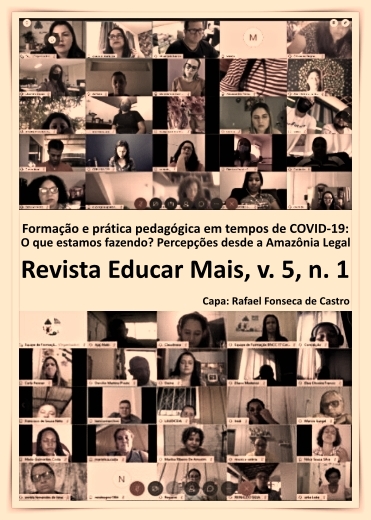The 'Aulas em Casa' project and remote education during the COVID-19 pandemic: analysis of the experience of the state of Amazonas
DOI:
https://doi.org/10.15536/reducarmais.5.2021.2220Keywords:
Education, Pandemic, Remote Learning, Amazonas.Abstract
Due to COVID-19 pandemic, in-person classes all over the world were suspended. In Amazonas, the educational secretariats in the city of Manaus and state-wide, implemented a project named 'Aula em Casa' (as in Home Class) which enable content through open television, cellphone apps, YouTube, Facebook and a learning focused virtual environment. The objective was to analyse this project from the teacher's narratives regarding conditions and demand of remote learning in Manaus in the light of historic-cultural theory. Six municipal teachers participated of this study, which produced weekly reports of their experience during social confinement. The main obstacles and solutions proposed by the local government were identified. In conclusion, the pandemic impact on people's lives, the efforts to center the content transmission disregarding the importance of pedagogic mediation were all considered. The escapade for such complex question must be constructed in partnership with the whole educational community, especially amplifying the comprehension in the pedagogic process
Downloads
References
ALVES, Maria Teresa Gonzaga; SOARES, José Francisco; XAVIER, Flavia Pereira. Índice socioeconômico das escolas de educação básica brasileiras. Ensaio: aval. pol. públ. Educ., Rio de Janeiro, v. 22, n. 84, p. 671-703, set. 2014 . Disponível em <http://www.scielo.br/scielo.php?script=sci_arttext&pid=S0104-40362014000300005&lng=pt&nrm=iso>. acessos em 13 nov. 2020. https://doi.org/10.1590/S0104-40362014000300005.
ATLAS dos Objetivos de Desenvolvimento Sustentável no Amazonas. Universidade Federal do Amazonas (UFAM), Programa de Programa de Pós-Graduação em Ciências do Ambiente e Sustentabilidade na Amazônia (PPGCASA). Manaus: UFAM/PPGCASA, 2020. Disponível em: <https://www.atlasodsamazonas.ufam.edu.br/>. Acesso em: 25 set. 2020.
GARCIA-PARPET, Marie-France. Coup d’œil sur l’éducation au Brésil de Bolsonaro: Pas de financements pour la philosophie et la sociologie : il faut respecter l’argent du contribuable. Savoir/Agir, v. 49, n. 3, p. 95-103, 2019.
CONSELHO ESTADUAL DE EDUCAÇÃO DO AMAZONAS (CEE/AM). Resolução Nº 30 de 18 de março de 2020. Dispõe sobre o regime especial de aulas não presenciais no Sistema de Ensino do Estado do Amazonas, como medida preventiva à disseminação do COVID-19. Disponível em http://www.educacao.am.gov.br/wp-content/uploads/2020/03/Resolucao-30-ano-2020-1.pdf Acesso 20 de setembro de 2020.
CONSELHO NACIONAL DOS DIREITOS DA CRIANÇA E DO ADOLESCENTE. Manifestação do CONANDA sobre o direito à educação de crianças e adolescentes durante a pandemia do covid-19. Brasília, DF: CONANDA, 2000.
FUNDAÇÃO DE VIGILÂNCIA SANITÁRIA (FVS-AM). Boletim diário de casos COVID-19. Disponível em http://www.fvs.am.gov.br/media/publicacao/13_12_20_BOLETIM_DI%C3%81RIO_DE_CASOS_COVID-19.pdf Acesso em 10 de dezembro de 2020
INSTITUTO BRASILEIRO DE GEOGRAFIA E ESTATÍSTICA (IBGE). Pesquisa por Amostra Domiciliar Contínua (PNADC) de 2017. Brasília, DF: IBGE, 2017.
INSTITUTO BRASILEIRO DE GEOGRAFIA E ESTATÍSTICA (IBGE). Pesquisa Nacional por Amostra de Domicílios Contínua - Tecnologia da Informação e Comunicação (Pnad Contínua TIC) de 2018. Brasília, DF: IBGE, 2019.
SECRETARIA DE ESTADO DE EDUCAÇÃO E DESPORTO DO AMAZONAS (SEDUC). Gabinete do Secretário. Portaria GS Nº 311 de 20 de março de 2020. Institui, no âmbito da rede pública estadual de ensino do Amazonas, o regime especial de aulas não presenciais, para a educação básica, como medida preventiva à disseminação do COVID-19. Disponível em http://www.educacao.am.gov.br/wp-content/uploads/2020/03/Portaria-GS-311-de-20-03-20-20-03-2020-5-26-PM-1.pdf Acesso 20 de setembro de 2020. 2020a.
SECRETARIA DE ESTADO DE EDUCAÇÃO E DESPORTO DO AMAZONAS (SEDUC). Secretaria Executiva Adjunta Pedagógica. Departamento de Políticas e Programas Educacionais. Diretrizes Pedagógicas para o Regime Especial de Aulas Não Presenciais. Disponível em http://www.educacao.am.gov.br/wp-content/uploads/2020/03/DIRETRIZES-PEDAGoGICAS-23.03.pdf Acesso em 20 de setembro de 2020. 2020b
SECRETARIA DE ESTADO DE EDUCAÇÃO E DESPORTO DO AMAZONAS (SEDUC). Secretaria Executiva Adjunta Pedagógica. Nota de Esclarecimento à Comunidade Escola Acerca do Regime Especial de Aulas Não Presenciais. Disponível em http://www.educacao.am.gov.br/wp-content/uploads/2020/03/NOTA-DE-ESCLARECIMENTO-A-COMUNIDADE-ESCOLAR.pdf Acesso 20 de setembro de 2020. 2020c.
MICHETTI, Miqueli. Entre a legitimação e a crítica: as disputas acerca da Base Nacional Comum Curricular. Revista Brasileira de Ciências Sociais. v. 35, n.102, p. 1-19, 2020.
TARABINI, Aina. ¿Para qué sirve la escuela? Reflexiones sociológicas en tiempos de pandemia global. RASE: revista de sociología de la educación. v. 13, n. 2, p. 145-155, 2020.
UNICEF intensifica entrega de Kits ‘Rumo ao Enem’, em Manaus. Portal A Crítica. Caderno Ação Social. 10/12/2020. Disponível em https://www.acritica.com/channels/educacao/news/unicef-intensifica-entrega-de-kits-rumo-ao-enem-em-manaus. Acesso em 10 de dezembro de 2020.
Downloads
Published
How to Cite
Issue
Section
License
Copyright (c) 2021 Iolete Ribeiro da Silva, Camila Ribeiro da Silva

This work is licensed under a Creative Commons Attribution-NonCommercial 4.0 International License.
DECLARATION OF RESPONSIBILITY: I hereby certify that I partially or fully participated in the conception of the work, that I did not hide any links or financial agreements between the authors and companies that may be interested in this article publication. I certify that the text is original and that the work, partially or fully, or any other work with a substantially similar content written by me, was not sent to any other journal and it will not be send while my submission is being considered by Revista Educar Mais, whether in printed or electronic format.
The author responsible for the submission represents all the authors of the manuscript and, when sending the article to the journal, guarantees s/he has obtained the permission to do so, as well as s/he guarantees the article does not infringe upon anyone’s copyright nor violate any proprietary rights. The journal is not responsible for the opinions expressed.
Revista Educar Mais is Open Access, does not charge any fees, whether for submission or article processing. The journal adopts Budapest Open Access Initiative (BOAI)’s definition, i.e., any users are permitted to read, download, copy, distribute, print, search and link to the full texts of these articles.
All the articles are published under the Creative Commons Atribuição-NãoComercial 4.0 Internacional license. The authors keep the copyright of their production. That way, they must be contacted directly if there is any interest in commercial use of their work.
















